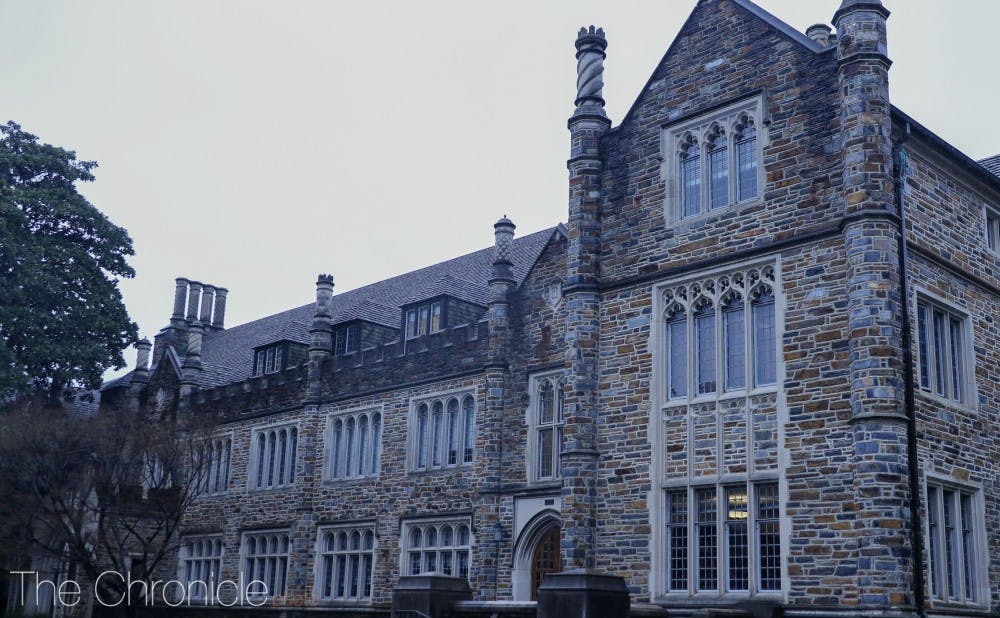Content warning: This story includes detailed accounts of sexual harassment.
Last year, Lara Haft, Trinity ‘17, spoke with The Chronicle on the condition of anonymity about her experience with Duke’s handling of sexual harassment allegations against Melvin Peters, professor of religious studies. Peters’ name was not included in the story.
At the time, Haft wanted her peers to know about how sexual harassment can pervade academia and how Duke’s process lacked transparency or effectiveness in addressing sexual harassment. She was afraid of the repercussions of naming her alleged harasser.
Now, she’s ready to go public to support another accuser.
Last week, Jill Hicks-Keeton—Master of Theological Studies ‘07, Ph.D. ‘14, and now an assistant professor of religious studies at the University of Oklahoma—tweeted claims that Peters humiliated and harassed her when she was a graduate student at Duke in 2008.
“I was the only woman in the Greek Bible doctoral seminar. This was not lost on Prof. Mel Peters, the teacher who week after week directed comments at me or about me that singled out my femaleness,” Hicks-Keeton wrote in a letter addressed to President Vincent Price.
According to Hicks-Keeton, Peters made comments about her appearance and once asked about her undergarments. Earlier this week, four of Hicks-Keeton’s peers—Nathan Eubank, Ph.D. ‘12, Benjamin Gordon, Ph.D. '13, Stephen Carlson, Ph.D. '12, and Daniel Felts, Master of Divinity '07—who said they were in that class wrote a letter to Price in support of Hicks-Keeton’s story and tweeted it.
“I felt objectified, degraded, and violated,” Hicks-Keeton wrote in her letter to Price. “I felt alone and, against my will, on view for the men in the room.”
Peters did not respond to multiple requests for comment sent by email and did not appear to be at his office when The Chronicle attempted to reach him there Monday regarding the allegations.
According to course listings, Peters taught in 2018 but is not teaching this semester. Michael Schoenfeld, vice president for public affairs and government relations, confirmed in an email that Peters taught in 2018.
"There are no plans for him to be scheduled to teach in the future," Schoenfeld wrote.
He would not comment when asked if it was a result of the harassment allegations.
In her letter, Hicks-Keeton goes on to say that she went to the Office of Institutional Equity—which handles harassment and discrimination complaints—to make a complaint, but she was “worried about retaliation” and couldn’t bring herself to attach her name to it. As the only woman in the class, it would have been obvious who complained, she wrote.
Nearly a decade later, Lara Haft said she had a similar experience.
Haft’s experience
In 2017, then-senior Haft took a class about race and religion with Peters. She told The Chronicle that by the end of the semester, Peters had created an uncomfortable environment for her by talking about her appearance and regularly asking her before and during class to get coffee. Another student in the class told The Chronicle that Peters made inappropriate comments towards Haft.
“I started dreading going to class, because every time I walked in the door he had a comment about what I was wearing—if I wore a normal outfit and mascara, I looked ‘lovely’ and if I wore a sweatshirt he would say ‘Surely [you] are heading to the gym,’” she told The Chronicle last year. “He asked me to meet for coffee one-on-one to ‘pick my brain’ most weeks, too, which I declined again and again.”
Haft said she went back and forth about whether Peters’ behavior was inappropriate. At points, she thought he could just be an overly-friendly old guy. But then, in March 2017, Haft said that Peters asked her for a hug.
“One day after class he walked up to me and said, ‘I’m sad, can I have a hug?’ I stood there frozen, with no idea how to respond to the request—I stood there awkwardly while he put his arms around me,” she said.
Haft said she decided not to file an official complaint with the Office of Institutional Equity but shared her experience with OIE and various religious studies department administrators. OIE decided to follow-up on Haft’s concerns with an investigation that included an interview with Peters.
Get The Chronicle straight to your inbox
Sign up for our weekly newsletter. Cancel at any time.

“During his interview, the instructor denied engaging with you in an inappropriate manner,” concluded an OIE investigation report obtained by The Chronicle. “He also denied some of the incidents you reported. The instructor acknowledged using phrases that were personal or intended to engage with students, but explained they were not used in a romantic or sex based context.”
Last year, Chronicle reporters met with Peters to get his response to Haft’s allegations. He declined to comment then and has not responded to Chronicle’s most recent requests for comment.
‘I have heard nothing since then’
In addition to the nature of the comments Peters made, Haft and Hicks-Keeton’s experiences had other similarities. They both say that they spoke with Cynthia Clinton, assistant vice president in OIE who focuses on harassment and discrimination prevention and compliance. Clinton declined to comment in an email to The Chronicle Monday night.
In 2008, Hicks-Keeton and three of her male classmates spoke with OIE about Peters’ behavior, according to a letter the classmates wrote.
“A short time later, someone from Duke OIE called me (Nathan Eubank) to tell me she had discussed the matter with Dr. Peters and that Dr. Peters would have appreciated it if we had spoken to him directly,” the letter reads.
Talking to Peters, the students wrote, was “not a serious option.” The letter says that their point in alerting OIE was to address the matter “with someone with institutional support without fear of retaliation.”
Hicks-Keeton did not name Peters to Clinton in 2008, but she decided to file a formal complaint in September 2018 after realizing that Haft’s anonymous account in The Chronicle last year was about Peters.
“With the feeling of relative security offered by a tenure track job and a book out, I was finally ready to move forward and tell my story with my name attached,” she wrote in her letter to Price.
It has been more than six months since filling her complaint.
“I have heard nothing since then,” Hicks-Keeton wrote in the letter.
Duke has a statute of limitations as part of its harassment policy, which limits when a complainant can file a complaint after the harassment incident occurred. For students, complaints are actionable until the student graduates. For all others, a complaint must be filed “no more than year after the most recent conduct alleged to constitute harassment.”
Last year, Clinton wrote in an email to The Chronicle that the time limit is “intended to support the integrity and effectiveness of an investigation,” and wrote that OIE can initiate a complaint after a year “if the nature of the allegation or complaint is particularly egregious."
Clinton declined to comment recently when emailed questions that included whether a statute of limitations would apply to Hicks-Keeton’s complaint.
According to an Inside Higher Ed article, some faculty members in the department expressed frustration with OIE’s process and said that they were limited in what they could say.
“We wholeheartedly endorse Duke's policy of intolerance of sexual harassment,” Department Chair David Morgan, professor of religious studies, told Inside Higher Ed. “We stand solidly with the victims and we have worked hard to support the university's response to reported instances of harassment.”
‘Way to go, Mel!’
Last week, Hicks-Keeton wrote that she saw a post from the Department of Religious Studies’ Facebook page.
“Pres. Vincent Price has recognized Prof. Mel Peters as a Celebrating Mentors honoree,” the post said, according to a screenshot Hicks-Keeton posted on Twitter. “He was honored at a special reception held on March 25th at the Sarah P. Duke Gardens. Way to go, Mel!”
The post has since been deleted.
In her letter to Price, Hicks-Keeton wrote that she was outraged by Peters receiving the award and asked for it to be rescinded. Schoenfeld wrote the award is run by the development offices, which “invites graduating seniors to designate their Senior Gift in recognition of a faculty member, advisor or fellow student.”
He added that Price did not select or approve the award, and that he didn’t attend the awards’ reception.
“While this particular program has been in place for a number of years, it will be revised to avoid confusion with official university awards,” Schoenfeld wrote in an email Saturday.
Haft wrote that it’s good that Peters is not teaching students now, but added that the community needs to be better at believing survivors when they’re at Duke, especially if they are workers.
“I think one of the reasons I was able to speak out on social media and have people believe me is because I’m an alum,” she wrote.
Bre Bradham contributed reporting.
If you have had experiences with sexual harassment or the Office of Institutional Equity that you would like to share with The Chronicle in a confidential manner, please contact Bre Bradham at breanna.bradham@duke.edu.
Correction: An earlier version of this story incorrectly identified Peters and colleagues as being within the Divinity School. The Department of Religious Studies is within Trinity College of Arts and Sciences. The Chronicle regrets the error, and the photo has been updated.
Class of 2019
Editor-in-chief 2017-18,
Local and national news department head 2016-17
Born in Hyderabad, India, Likhitha Butchireddygari moved to Baltimore at a young age. She is pursuing a Program II major entitled "Digital Democracy and Data" about the future of the American democracy.

